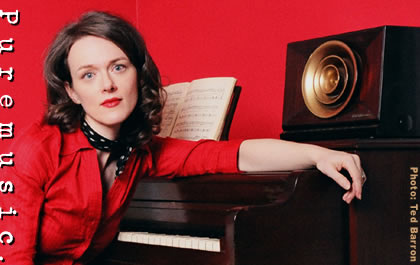
A Conversation with Laura Cantrell (continued)
PM: Let's talk a little more about J.D. Foster. What's the dynamic and the chemistry like there? What's his personality in the studio?
LC: Well, it was interesting. He's something that I really appreciate: he's an old-fashioned music person and producer, in that he believes in spending a lot of time in the studio. And technology is only there to make certain things easy, but he doesn't want that to substitute for real performances, real emotion and real musicality. He doesn't want to have to fix anything that's not worth being there in the first place. You know what I'm saying?
PM: Absolutely.
LC: So he wanted really high quality, and I really appreciated that. Again, as we mentioned about my own vocals, he really got me to up my own game quite a bit. And he's definitely somebody who has made very lush, beautiful sounding records for Richard Buckner, and I don't know if you're familiar with the Mark Ribot records that he produced.
PM: I am, yeah. I like Mark Ribot a lot.
LC: J.D. is working on the new album by Calexico, actually. He made a Dave Schramm record that I was very fond of. Dave is a local.
PM: I know. He's one of your guys. What was the Schramm record that Foster produced?
LC: It's called 100 Questions.
PM: Okay.
LC: Dave had had very high praise for J.D.'s process in the studio, and said that he was very encouraging, and really just wasn't going to impose some kind of producer's trip on what the music should sound like.
PM: Right.
LC: And that sounded good to me.
[laughter]
LC: I also knew that before J.D. was a producer he spent time in Dwight Yoakam's band. He was the bass player on Dwight's first two albums. And so I knew that he could play country music and knew country music very well, and that we would find some common ground together in our love of old country music. So that was my hope as we were getting to know each other. And indeed, that was the case. We really sat around talking about Wynn Stewart, and playing Merle Haggard, and just having a good time.
PM: [laughs] Wow. That's a very kind of psychedelically swinging outro to "Old Downtown" at the end of the record. Who's playing the guitar there?
LC: That is actually Dave Schramm.
PM: It's very cool.
LC: And he's probably playing ebow, as well. And then also Mark Spencer is on guitar. And some places I can't even tell who's actually playing which part, because there are a lot of other sounds. It's more soundscapey than it is about a guitar line. There's a lot of atmosphere on that part of the record. We felt it would be a good note to end on--sort of like if we'd started in this place people would have freaked out.
[laughter]
PM: Oh, yeah, absolutely. My advance copy had no player credits, as they tend not to, and I couldn't find it on the website.
LC: Oh, my.
PM: I hate to not know those things, so thanks for filling in the guitar players, at least on that cut. But who are some of the other core players? Who's on the bass?
LC: On that tune, particularly, it was Jeremy Chatzky, who's the main bass player that I've worked with for the last few years. The only tracks that don't have Jeremy on them, actually there's only one, and that would be when we did one song with Calexico, "And Still." That's Joey Burns and John Convertino of Calexico.
PM: Right.
LC: And Paul Niehaus along with Dave Schramm. And actually, John Graboff plays guitar and other instruments for a lot of this record as well. And he's played with me for a long time.
PM: Right. So I think there are four originals on this record. That's about your usual number, right?
LC: Yes.
PM: Is that because, well, that's just how prolific you are, or is that just the mix of originals to found songs you prefer, or?
LC: I definitely wanted to have more of my own original numbers on this album. And it was frustrating to me, actually, that I found that despite having extra time, I didn't actually write any more quickly or finish things more consistently than when I was working full time.
PM: Interesting.
LC: I think that's still because I kind of quit and was on tour, and there was a long transition that I went through into feeling comfortable just knowing when to work and how to do it. But I definitely felt good about the ones that I finished and that ended up on the album. I thought they held up well against the other songs that I picked, and against my older songs.
PM: Absolutely.
LC: So I don't worry myself too much about the quantity of my own songs. That said, I do get asked every now and again, "Will you ever do an album of all of your own compositions?" And I might, if I get--
PM: "If I got twelve at a time, you'll be the first to hear them," yeah.
LC: I don't see much reason to wait around.
PM: No. continue